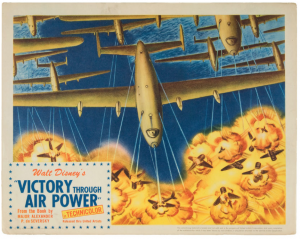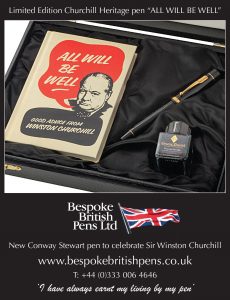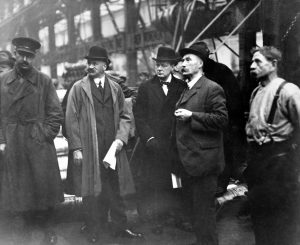
Finest Hour 185
Churchill and Portal: A Strategic Relationship
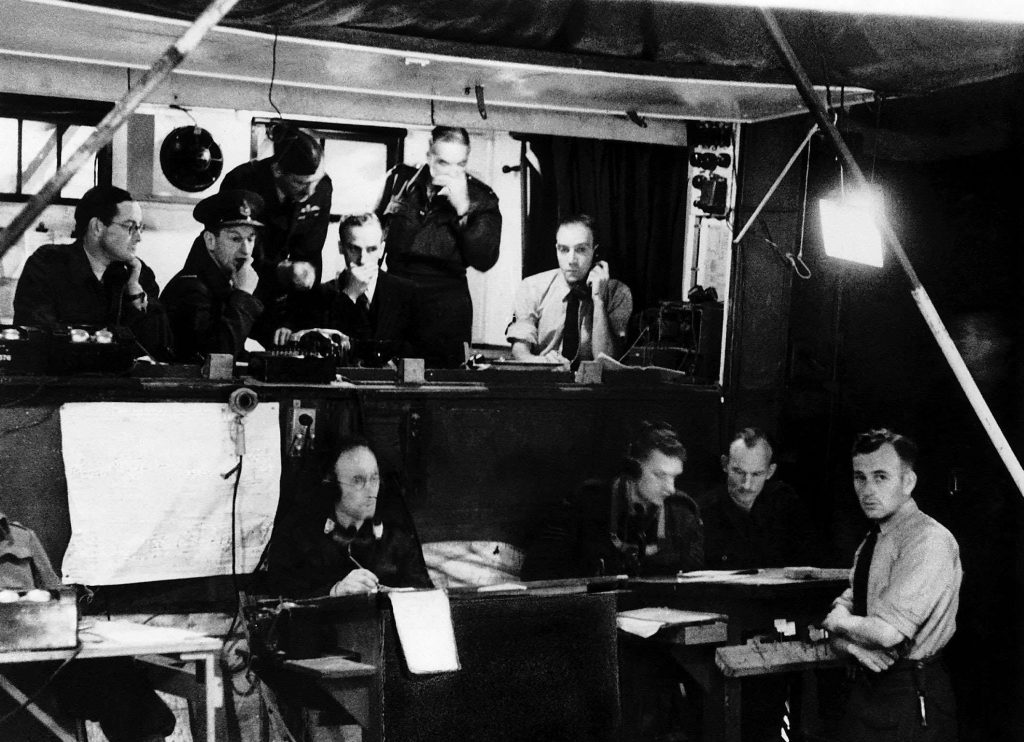
Portal with Secretary of State for Air Sir Archibald Sinclair (seated upper row center) July 1944
August 19, 2019
Finest Hour 185, Third Quarter 2019
Page 29
By Rich Milburn
Wing Commander Rich Milburn is an RAF officer and current instructor at the Air War College in Alabama. His doctoral dissertation will examine Portal’s leadership of the RAF during the Second World War. He is grateful to Dr. James Tucci of the School of Advanced Air and Space Studies for helpful comments, while acknowledging any errors to be entirely his own.
In his seminal article Is Strategy an Illusion? Richard Betts opined: “strategy is a series of relationships.”1 Effective relationships, like strategy, are built and conducted over significant periods of time. Winston Churchill certainly believed this; he considered that stability in the American and British Chiefs of Staff (COS) during the Second World War provided “an inestimable advantage for all.”2 Following the appointment of General Sir Alan Brooke as Chief of the Imperial General Staff (CIGS) in early 1941, the lone replacement on the British COS Committee for the remainder of the war was due to the death of First Sea Lord Sir Dudley Pound in 1943.
The longest-serving of all the military chiefs during the war was Sir Charles “Peter” Portal, leader of the Royal Air Force for more than five years. Nevertheless, Portal remains largely unknown, even within his former service. Study of him has been extremely limited because he was uncontroversial and kept no wartime diaries. Yet Portal’s detailed organizational knowledge, his patient and logical disposition, and his grand strategic outlook enabled him to forge a remarkably important relationship with Prime Minister Churchill that proved crucial to the British war effort.
Rising Star

2025 International Churchill Conference
Portal’s appointment, at only forty-seven years old, was inevitable as “the accepted star of the RAF.”3 A decorated commander in the First World War, Portal was marked afterwards by Sir Hugh Trenchard, the “Father of the Royal Air Force,” for higher office. Portal served in several key staff appointments alongside Trenchard, as well as spending multiple tours in military education and excelling as both a squadron commander and joint commander in Aden. His rise was meteoric but fully deserved and reached its apex when he replaced Cyril Newall as Chief of Air Staff (CAS) in October 1940. The infusion of new blood to the COS Committee was no accident. Following one late meeting involving the Chiefs, Churchill remarked, “I have to wage modern war with ancient weapons.”4 The remark was somewhat ironic since the Prime Minister was older than all three Chiefs, but younger men were needed because Churchill was a demanding taskmaster.
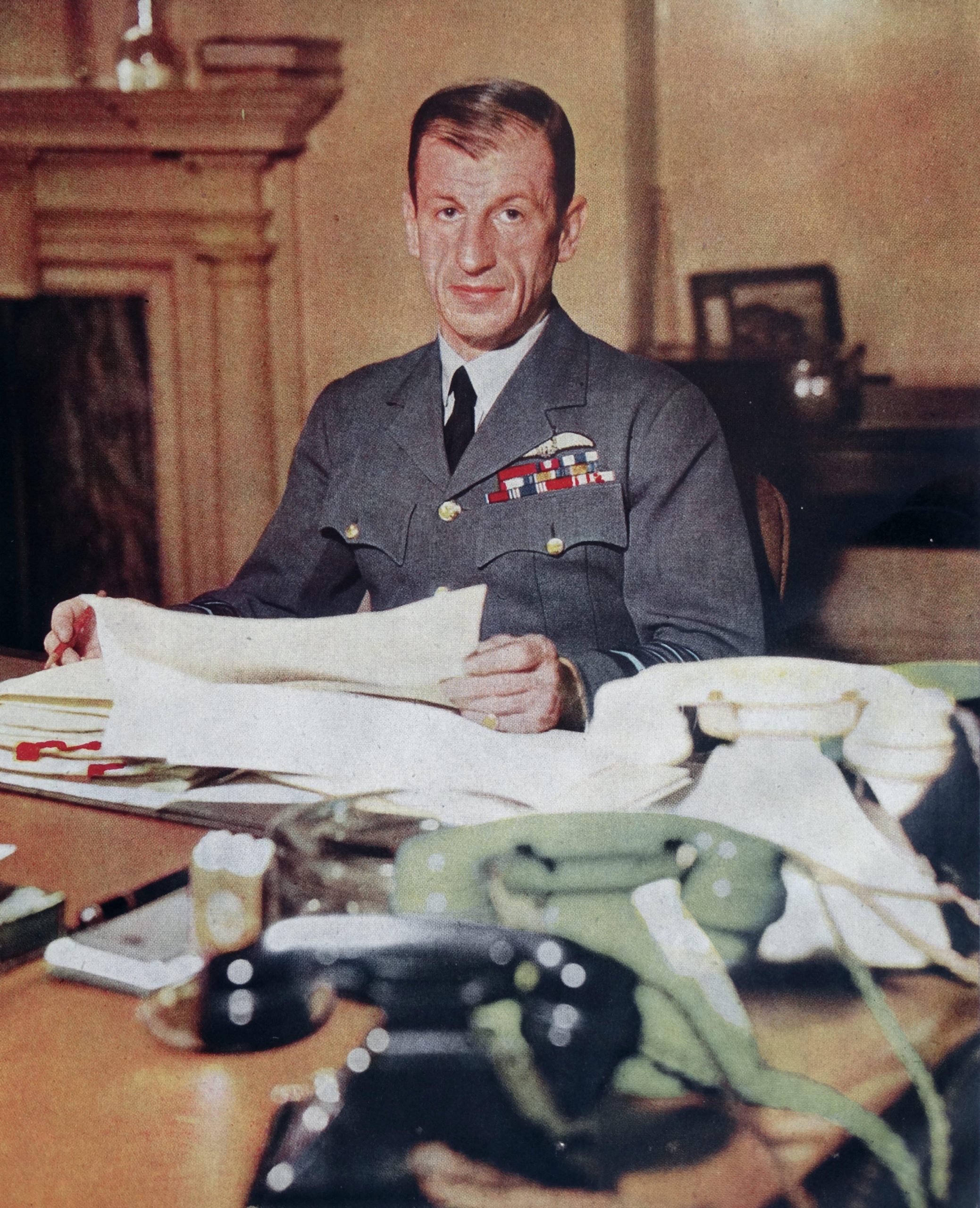
Churchill was given to excesses of opinion, to wild and inaccurate strategic assessments, to great impatience, and occasional fits of pique. He incorrectly predicted the obsolescence of the tank, the defensibility of single vessels against aircraft, and the likely static nature of land warfare in the future. By contrast, he was one of the first to recognize the threats from both Nazism and communism. President Roosevelt once observed, “Winston has fifty ideas a day, and three or four are good.”5 Churchill needed a stabilizing voice to curb his excesses and more disciplined strategic thinkers to direct his legendary energy. Portal was Churchill’s perfect foil.
Churchill’s modus operandi allowed him to operate throughout the war and survive intact where many younger men faded. He read in bed during the morning, napped in the afternoon, and worked late into the night. He typically started COS meetings at 9:30 pm and finished them well after midnight. These hours were especially challenging for the Chiefs, who had to lead their services during the day. But everyone had to dance to the Prime Minister’s tune, a peculiar battle rhythm exacerbated by Churchill’s personal manner.
Working with Winston
Churchill relentlessly questioned the Chiefs about all areas of the war: strategy, tactics, technology, and logistics. He did not wish to divine the minutiae of each service, just to ensure his Chiefs were on top of things. The avalanche of minutes emanating from the Prime Minister’s office led to outpourings of frustration by some. General Brooke penned the most acerbic critique. In September 1944 he wrote, “[Churchill] has got only half the picture in his mind, talks absurdities and makes my blood boil to listen to his nonsense….Never have I admired and despised a man simultaneously to the same extent.”6 Brooke found Churchill equally exasperating and inspiring, his passion for operational details only matched by his ignorance of them. Portal, by contrast, took it all in his stride.
Churchill had particular bones of contention he addressed repeatedly. A favorite Air Force topic was the ratio of aircraft to personnel. In Portal’s first month as CAS, Churchill queried the “very large excess of crews” in Army Co-operation Command (ACC) squadrons; they had 177 crews and 147 aircraft. Churchill suggested the excess could offset the marked shortage of pilots in Bomber Command.7 Portal’s response was, perhaps, surprising. Instead of grasping the opportunity to reinforce the RAF’s bomber force, the command of which Portal had just relinquished, he instead defended ACC manning levels:
It is true that there are more pilots than aircraft in Army Co-operation squadrons, but there are sound reasons for this. In the first place, there are no O[perational].T[raining].U[nits].s for these squadrons other than No. 112 Canadian squadron, which is used as a training squadron to No. 110 Canadian squadron. In all the other squadrons, it is necessary to train pilots in the squadrons themselves to hold a reserve against possible casualties. The main task of these squadrons at present is training in co-operation with Army Commands, but they have many additional duties laid upon them. They are called on to provide rescue services for fighter pilots shot down over the sea, to provide pilots to fly communication aircraft for the Army Command, and to train future glider pilots in Moth aircraft.
In spite of this, we have recently reduced our commitment to Home Forces by 30% in order to free pilots for operational commands, and we have economised in pilots by not filling up Army Co-operation training courses for some time past, the pilots thus made available being released for Fighter Command. The present provision of pilots is therefore not excessive for the existing commitments, and I feel certain that the War Office would be most reluctant to accept any further decrease in the scale of air co-operation provided for the Army.
On the day you mention it is true only 147 aircraft were shown as available for immediate operations, but the squadrons were in fact very nearly up to establishment. As in all squadrons, a number of aircraft were undergoing routine overhauls and minor repairs.8
Several elements in Portal’s communiqué encapsulate his thinking as CAS. Portal was, first and foremost, a joint officer. He refused to play inter-service politics, if it would detract from the overall fight. Secondly, Portal fully understood the nuanced differences and requirements of his disparate organizations. The absence of Operational Training Units (OTUs) from ACC necessitated more frontline pilots. Portal knew some pilots would be in training in the squadrons, because, in the absence of OTUs, flying training had to take place there. The combination of additional students and instructors led to a higher squadron establishment than in other RAF squadrons. Portal analyzed the situation carefully on individual merit before making a recommendation that Churchill followed. But the Prime Minister was not done yet. He soon chose another strategic approach.
The Mediterranean
In November 1940, Churchill complained of the “astounding disparity between operational fighting strength and the total ration strength personnel” in the Mediterranean theater.9 Arthur Longmore, the Air Commander in the Mediterranean, had reported having 200 operationally fit aircraft and 17,000 personnel, or about seventy-seven Airmen per serviceable machine. “The pilot question is even more pointed,” Churchill observed. “Here we have just under 1,000 pilots for only 220 serviceable operational machines, or between 4 and 5 pilots for every machine. It is surely not necessary, and when we see how very short we are of pilots at home, it would seem a duty to transfer some of these great numbers of pilots for whom there are no machines fit to fly, or any use for fighting, to home establishments.”10
Portal’s reply was characteristically detailed and logical: “The disparity between the number of men and the number of aircraft on charge is always striking but it is not really so great as you suggest. In addition to the 220 operationally fit aircraft of modern types, which you mention, there are 530 serviceable aircraft of older types, some of them obsolescent. A proportion of these are still engaged on active operations and the rest in training co-operation with the Army, communication and other similar duties; all have to be maintained in a serviceable condition. There are, therefore, 750 aircraft to compare with the 17,000 personnel. The latter of course include all the officers and airmen employed on staffs, on transport, on defence of aerodromes and on administrative and other duties.”11
Portal was as equally versed in the unique conditions of Mediterranean Command as those of ACC. In this case, there were two main factors. There were more aircraft in the theatre than reported to Churchill, and, being overseas, there was a vast staff and defense network inflating the numbers compared to domestic commands. Portal continued:
The actual number of heads per serviceable aircraft, therefore, works out at something under twenty-three. This is about 60% of the number found necessary for the Air Force working with the British Army in France and is actually less than the number per machine on the battle front in the last war, when aircraft and engines were far more easily repaired and maintained than they are today.12
Portal again identified individual environmental characteristics, and mitigating factors altering any calculus. Later in the minute, Portal described the long lines of communication in the theatre and how the changing flux of war necessitated a generous allocation of personnel because sending reinforcements would be time-consuming. This represents a hallmark of Portal’s leadership. He was consistently loath to make rash adjustments, ever aware of the friction inherent in moving personnel between theaters. Churchill, though, was correct to identify possible inefficiencies and keep the CAS honest. Unsurprisingly, Churchill’s inquiries did not stop there.
On 1 May 1941, Churchill queried the gap of 442 between the effective strength of crews in Fighter Command and the number of aircraft, with a gap of 126 when only “fully operational” crews were considered.13 Having seen several iterations of this discussion, Portal somewhat sardonically responded, “I am sorry that I have not already made clear the reason for this gap.” He then continued, “It is that, owing to the fact that at any one time, a number of pilots in each squadron are resting or on leave or sick, it is necessary to have a larger number of pilots on establishment than aircraft.”14 Churchill, recognizing his game had been rumbled, quipped back asking whether the pilots had to go on leave or be sick together.
Diplomatic Airman
Churchill had a deliberately confrontational method of engagement with Portal, indeed with all the Chiefs of Staff. The Prime Minister was no technical or subject matter expert, so used detailed and repeated questions to probe subordinates for signs of ignorance. Brooke became frustrated, but Portal reveled in the intimate details. Churchill’s minutes forced Portal to reconsider his assumptions, a process Portal valued. He had demonstrated his mettle early on, gained the trust of the Prime Minister, and, moreover, shown a talent for both holistic thinking and preferring diplomacy over parochialism.
It was in the diplomatic arena that Portal was of greatest value to Churchill. Eisenhower wrote of the CAS: “His distinguishing characteristic was balance, with perfect control of his temper; even in the most intense argument I never saw him show anger or unusual excitement.”15 Portal grasped both the importance of the American alliance and how much could be achieved through the LendLease Act, which provided the RAF with additional aircraft that could not be produced by British industry.
The importance of Portal to Churchill is best evidenced following an announced reduction in the British allocation of aircraft from the US. In the aftermath of the attack on Pearl Harbor and the American entry into the war, change was inevitable. Portal, understanding Churchill was likely furious about the reduction in allocation, wrote the Prime Minister to pre-empt any histrionics during the forthcoming visit of US Army Air Force Commanding General “Hap” Arnold. Portal began by empathizing with Churchill’s point of view, one it would have been easy for the RAF service chief to share: “There is of course much to be said in reply to his (Arnold’s) arguments as we, for our part, feel that any sudden curtailment of deliveries upon which we had counted would involve grave loss to the common effort.”16 Portal, however, then recommended a more diplomatic strategy:
You may decide that your reply should not dwell on this aspect of the matter but instead should concentrate on the practical results we hope to achieve from the forthcoming discussions. In that event, I suggest the following would be the principal points to be brought out:
(i) that we recognise and applaud the anxiety of the U.S. Air Forces to throw their full weight into the fight as early as possible;
(ii) that a common expansion plan is necessary if maximum effort is to be obtained with the forces available;
(iii) that in constructing such a plan the aim should be to secure the maximum impact of air power against the enemy that production and shipping permit—irrespective of whether British or U.S. pilots man the aircraft;
(iv) that the visit of Arnold and [US Navy aeronautics bureau chief Adm. John] Towers is an essential stage in the preparation of such a plan and is heartily welcomed on that account;
(v) that we agree the final stages of the discussion will probably have to be concluded in Washington and that for this purpose I should return to the U.S. with Arnold and Towers.17
Portal’s minute perfectly encapsulates his personal qualities in action. He encouraged Churchill to build bridges with Arnold rather than trying to maximize the output of Lend-Lease for the Royal Air Force. It took great self-confidence to send the minute in the first place, but Portal’s strategic awareness and grand vision were vital. Portal understood America would fight on its own terms and realized that a close US-UK relationship was in Britain’s best interests, even though this delayed the build-up of Bomber Command. Portal was extremely concerned about being able to strike Germany with an enlarged bomber force, but building the alliance was more important. He was willing to support the American point of view despite a significant loss of materiel for Bomber Command. In his own account of the negotiations, Arnold describes Churchill and Portal as having been extremely willing to see things from his perspective.18 Portal pursued a strategic bargain, instrumental in forging the Alliance relationship but which must have been, at some level, a bitter pill to swallow.
Best of the Best
Portal’s ability to anticipate Churchill’s blind spots made him a key advisor. He was patient where Churchill was impetuous and logical where Churchill was emotional. Churchill infused spirit into Britain through force of personality, but men like Portal ensured a strategic governor was applied to Churchill’s preternatural thrust. This Portal did quietly and calmly but with steely determination.
Lord Ismay, Churchill’s Chief of Staff during the war, delivered his own assessment of Portal when asked: “I know it is a very difficult question to answer, but who do you consider to have been the greatest commander on our side during the war?” Ismay answered, “It isn’t a difficult question to answer at all. The answer is Peter Portal: quite easily.”19
Endnotes
1. Richard K. Betts, “Is Strategy an Illusion?” International Security 25, no. 2 (2000), p. 6.
2. Winston S. Churchill, Their Finest Hour (London: Cassell, 1951), p. 18.
3. Ibid., p. 17.
4. John Kennedy, The Business of War: The War Narrative of Major-General Sir John Kennedy (London: Hutchinson, 1957), p. 60.
5. Gretchen Craft Rubin, Forty Ways to Look at Winston Churchill: A Brief Account of a Long Life (New York: Ballantine, 2003), p. 29.
6. Eliot A. Cohen, Supreme Command: Soldiers, Statesmen, and Leadership in Wartime (New York: Anchor, 2003), p. 98.
7. Churchill to Portal, 24 Oct 40, Archive 1, Folder 1, Minute 4A, Sir Charles Portal Papers, Christ Church (CC), Oxford.
8. Portal to Churchill, 31 Oct. 40, CC 1/1/4B.
9. Churchill to Portal, 17 Nov. 40, CC/1/1/14E.
10. Ibid.
11. Portal to Churchill, 1 Dec. 40, CC/1/1/14G.
12. Ibid.
13. Churchill to Portal, 1 May 41, CC/1/2/22.
14. Portal to Churchill, 4 May 1941, CC/1/2/23.
15. Dwight D. Eisenhower, Crusade in Europe (Garden City, NY: Doubleday, 1948), p. 266.
16. Portal to Churchill, 16 May 1942, CC/1/3/35.
17. Ibid.
18. Bill Yenne, Hap Arnold: The General Who Invented the US Air Force (Washington: Regnery, 2013), p. 100.
19. Letter from Gerald C. Williams to Denis Richards, October 1972, CC/3/XVI.
Subscribe
WANT MORE?
Get the Churchill Bulletin delivered to your inbox once a month.

